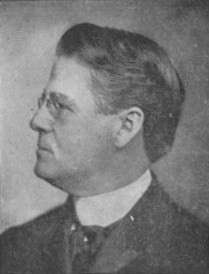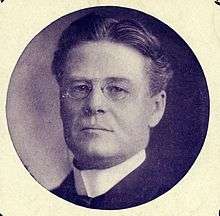William Furst
William Wallace Furst (March 25, 1852 – July 11, 1917) was an American composer of musical theatre pieces and a music director, best remembered for supplying incidental music to theatrical productions on Broadway.

Biography
Furst was born in Baltimore, Maryland.[1] He studied music in Baltimore, and was a church organist at the age of 14.[2]
Career
Furst's comic opera Electric Light was produced and conducted by him in 1878, and for the five seasons following he received engagements as conductor of opera.[2] By the 1880s, he was composing theatrical music for productions starring Herbert Beerbohm Tree, Maude Adams, Otis Skinner, William Faversham, Viola Allen and Mrs. Leslie Carter. He composed the music for five Shakespeare productions by Margaret Anglin at the Berkeley Stadium in California, as well as her production of Electra.[3] One of his earliest operettas was My Geraldine (1880).[4]

In the late 1880s and early 1890s, Furst was the orchestra director at the Tivoli Theatre in San Francisco, California. He composed his only opera, Theodora, for the Tivoli. In 1892, he composed the successful operetta The Isle of Champagne. In 1893, he published "The Girl I Left Behind Me" and moved to New York City, becoming the music director at the now-demolished Empire Theater.[3] The same year, he composed the music (along with Charles Alfred Byrne and Louis Harrison) for the musical Miss Nicotine with Lillian Russell[5] and Marie Dressler[6] Another such Empire piece was The Little Trooper, starring Della Fox (1894) followed by The Little Minister (1897).[4] In 1898, he composed another such piece for the Empire, A Normandy Wedding (an adaptation of the French Papa Gougon), which received an enthusiastic reception in New York at the Herald Square Theatre.[7]
By 1900, Furst also had fairly steady work as a composer/arranger of incidental music to accompany theatrical productions. He produced music for, or was music director for numerous plays, including a steady stream of dramas produced by David Belasco and Charles Frohman. Two plays by Belasco which had Furst's musical accompaniments, Madame Butterfly and The Girl of the Golden West, were made into operas by Giacomo Puccini who attended their New York productions. Musicologist Allan W. Atlas has shown that Puccini modeled some music heard in his opera La fanciulla del West on Furst's music.[8] His last theatrical composition was music for Joan the Woman, starring Geraldine Farrar.[3]
Works

Musicals and Operettas
This list may not be complete.[9]
|
|
Plays with music by Furst
This list may not be complete.[10]
|
|
Furst as conductor
Furst served as conductor/music director of many of the works that he composed. In addition, he is known to have conducted the following musicals and operettas:
- 1883 Green-Room Fun!
- 1893 An Artist's Model
- 1900 The Rose of Persia
Film music
- 1916 The Green Swamp[11]
- 1916 Let Katie Do It
- 1917 Joan the Woman
Legacy
Much of the music composed by William Furst remains unpublished. Since he wrote "for hire," many of his works remained with David Belasco. They now form a part of the David Belasco Collection of Incidental Music and Musicals in the Music Division of The New York Public Library for the Performing Arts. His work for Madame Butterfly and The Girl of the Golden West have been cataloged separately.
Notes
- 1910 United States Federal Census, available at Ancestry.com.
- Rines, George Edwin, ed. (1920). . Encyclopedia Americana.
- "Veteran Composer Wm. Furst Is Dead", The New York Times, July 12, 1917
- Albert, Karl. "William Furst" operetta listing, 2005
- Notes on Music, The New York Times, November 5, 1893, p. 10
- Information about Miss Nicotine and Marie Dressler
- "A Normandy Wedding", The New York Times, February 22, 1898
- Allan W. Atlas, "Belasco and Puccini: 'Old Dog Tray' and the Zuni Indians", Musical Quarterly 75, no. 3 (Autumn 1991), 362-98.
- This information is based on Richard C. Norton, A Chronology of American Musical Theater (New York: Oxford University Press, 2002).
- This information is based on information from the William Furst listing at the Internet Broadway Database and on his NY Times obituary.
- Information derived from https://www.imdb.com.